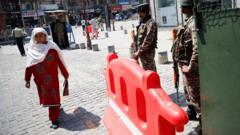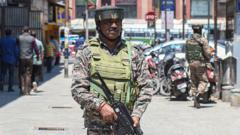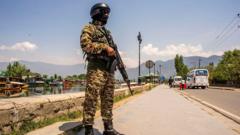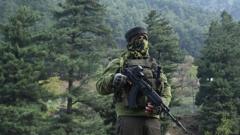Following a tragic attack in Kashmir, India and Pakistan's interactions have escalated, echoing past incidents marked by military strikes and diplomatic tensions. Experts emphasize the delicate balance between escalation and restraint in this ongoing conflict.
Tensions Resurge: India and Pakistan Face New Crisis Amid Ongoing Diplomatic Struggles
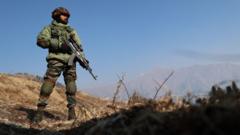
Tensions Resurge: India and Pakistan Face New Crisis Amid Ongoing Diplomatic Struggles
The recent deadly attack in Kashmir heightens the already strained relations between India and Pakistan, prompting an array of retaliatory measures and raising concerns about future escalations.
In light of recent escalations, India and Pakistan find themselves embroiled in yet another crisis, marked by a deadly militant attack in Pahalgam, Kashmir that claimed 26 civilian lives. This tragic incident feels hauntingly familiar, reminiscent of past confrontations marked by violence and diplomatic strife. Notably, prior attacks like the 2016 Uri assault and the 2019 Pulwama bombing have led to heightened military responses, with India executing surgical strikes across the Line of Control in retaliation.
In this latest case, experts underscore a troubling shift; unlike previous attacks targeting security personnel, the Pahalgam assault has directly impacted civilians, likening it to the catastrophic 2008 Mumbai attacks. Ajay Bisaria, a former Indian high commissioner to Pakistan, draws critical parallels between these events, stating, "This attack contains elements of both Pulwama and Mumbai."
In the wake of the Pahalgam tragedy, India's government adopted swift retaliatory actions, culminating in the closure of key border crossings, suspension of a water-sharing treaty, and the expulsion of diplomats. The atmosphere is further thickened by intermittent gunfire along the borders. Pakistan, too, has responded with visa suspensions and negotiations halts, all while historical grievances resurface from their decades-long conflict over Kashmir.
Notably, Bisaria recalls the precipitous decisions made post-Pulwama, where India swiftly escalated diplomatic tensions while maintaining access to communication channels, an approach they seem to emulate this time around. He emphasizes that past confidence-building measures could be eradicated swiftly, reflecting the fragile nature of Indo-Pak relations.
The pivotal moment came when Indian airstrikes targeted militant camps in Pakistan which sparked retaliatory actions leading to the historic aerial dogfight. The subsequent return of Indian pilot Abhinandan Varthaman after his captivity in Pakistan illustrates the delicate balance of power at play, where both nations seek to project strength yet are pushed into de-escalation due to mutual threats of conflict.
Critically, as experts analyze the evolving situation, they note that India's current stance reflects a dichotomy of intentions – to exercise restraint while potentially preparing for escalating measures, including threats to abrogate longstanding treaties. Bisaria captures this sentiment succinctly, stating, “We are still amidst a crisis,” underscoring the ongoing volatility and the uncertainty that looms over Indo-Pak relations in the current geopolitical landscape.








